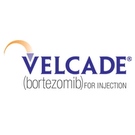Articles tagged with: Velcade
News, Resources»

Curcumin has been garnering increased attention as a potential anticancer treatment. It is the major active compound in turmeric, a popular Indian spice made from the rhizomes, or underground stalks, of a plant in the ginger family.
In multiple myeloma and the precursor condition monoclonal gammopathy of undetermined significance (MGUS), cell culture studies and one animal study have shown that curcumin can kill cancer cells and prevent them from multiplying. The Beacon also found two early-stage clinical trials studying curcumin’s effects in people with multiple myeloma and …
News»

A combination regimen of Velcade (bortezomib), Doxil (pegylated liposomal doxorubicin), and dexamethasone (Decadron), known as the VDD regimen, followed by Revlimid (lenalidomide) after autologous stem cell transplantation (ASCT) is an effective therapy for untreated multiple myeloma patients, according to a study recently published in the Journal of Clinical Oncology.
Velcade is a highly active therapeutic agent in multiple myeloma patients. It suppresses tumor growth by inhibiting the enzymes that break down critical proteins in cancerous cells. Although Velcade is approved as a single agent, previous studies have suggested …
News, Resources»

Phil Brabbs, a software product manager and former kicker for the University of Michigan football team, was diagnosed with smoldering multiple myeloma the day after his 28th birthday. “At 28, looking at my son who was two, you think, ‘Will this kid ever remember me?’ It was really frightening,” he said.
“To get a cancer diagnosis when it seems like you’re doing everything right – you don’t smoke, you drink modestly, you exercise – it was quite shocking. But I don’t think it took more than a week or two for me …
NewsFlash »
Panobinostat In Combination With Velcade Shows Potential For Relapsed Multiple Myeloma (ASH 2009) – Researchers presented results at the American Society of Hematology Meeting (ASH) from a Phase 1 clinical trial that show that oral panobinostat (Farydak, LBH589) in combination with intravenous Velcade (bortezomib) has anti-myeloma effects. Researchers tested different doses of both panobinostat (10 mg to 30 mg) and Velcade (1.0 mg/m2 to 1.3 mg/m2). They found frequent blood-related adverse events, such as thrombocytopenia (low blood platelet count) and neutropenia (low white blood cell count). They concluded that dosing will be modified for future Phase 2/3 studies. For more information, please see abstract 3852 on the ASH meeting Web site.
Afinitor Is Safe In Relapsed And Refractory Multiple Myeloma; Drug Will Move To Phase 2 Clinical Trials (ASH 2009) – Afinitor (everolimus) is safe in relapsed and refractory multiple myeloma, according to preliminary results from a Phase 1/2 clinical trial presented at the 2009 Meeting of the American Society of Hematology (ASH). Afinitor was given orally at 5 mg to 10 mg daily. Researchers observed only one case of thrombocytopenia (low platelet count). A sufficient amount of anti-myeloma activity was observed for this drug to continue to Phase 2 testing, which puts more emphasis on the efficacy of the drug. For more information, see abstract 3850 on the ASH annual meeting Web site.
ACE-011 Increases Hemoglobin And Helps Build Bone In Multiple Myeloma Patients Receiving Chemotherapy (ASH 2009) – Preliminary results from a study presented at the 2009 Meeting of the American Society of Hematology (ASH) reveal that ACE-011 (sotatercept) increases hemoglobin (an iron-rich protein in red blood cells) and bone formation, decreases bone pain, and has anti-tumor activity in multiple myeloma patients receiving chemotherapy. A low hemoglobin count indicates a low red blood cell count (anemia), which is a common complication in multiple myeloma, as are bone lesions, and bone pain. All participants were on a regimen of melphalan (Alkeran), prednisone, and thalidomide (Thalomid). For more information, see abstract 749 on the ASH meeting Web site.
Researchers Demonstrate Feasibility And Safety Of Vaccine In Multiple Myeloma (ASH 2009) – Preliminary results from a Phase 1 clinical trial of a multiple myeloma vaccine, presented at the 2009 Meeting of the American Society of Hematology (ASH), indicate that using a vaccine in multiple myeloma is possible and that it is safe and tolerable. The study included 15 patients who had undergone peripheral blood progenitor cell transplantation – a treatment in which stem cells are collected from the bloodstream of a healthy donor and delivered to the myeloma patient after high-dose chemotherapy. The most frequent side effects were local skin reactions, typical of most vaccines. Further studies will evaluate the vaccine’s full potential. For more information, see abstract 1858 on the ASH meeting Web site.
For more information about myeloma-related studies covered at ASH, please see the Myeloma Beacon coverage of the ASH 2009 Meeting.
News»

The findings of a new study suggest that a combination regimen of Velcade (bortezomib), thalidomide (Thalomid), and prednisone, abbreviated as VTP, is as effective as the standard combination of Velcade, melphalan (Alkeran), and prednisone, abbreviated as VMP, in the treatment of elderly patients with multiple myeloma. The trial also discovered that the addition of maintenance therapy led to increased response rates. Researchers presented their Phase 3 study results at the American Society of Hematology’s (ASH) 51st annual meeting in December.
While VMP without maintenance therapy currently is one …
News»

A recent study compared out-of-pocket costs for multiple myeloma patients in the United States being treated with Velcade (bortezomib), Revlimid (lenalidomide), thalidomide (Thalomid), or another chemotherapy or radiation therapy. The results were presented at the American Society of Hematology (ASH) Meeting on December 5.
This study looked at approximately 1,900 multiple myeloma patients who filed claims with a national health insurance company. Researchers looked at out-of-pocket costs for each patient for a period of one year after the start of a new course of treatment.
For the 1,900 patients, …
News»

The United States Food and Drug Administration (FDA) has approved changes to the prescribing information for Velcade (bortezomib), including the addition of long-term data from the VISTA trial showing that Velcade extends survival of newly diagnosed multiple myeloma patients. New dose recommendations for patients with moderate to severe liver damage were also added. The changes were approved in response to a supplemental new drug application (sNDA) submitted by Velcade’s manufacturer, Millennium: The Takeda Oncology Company.
The VISTA trial, titled “Velcade as Initial Standard Therapy in Multiple Myeloma: Assessment with
